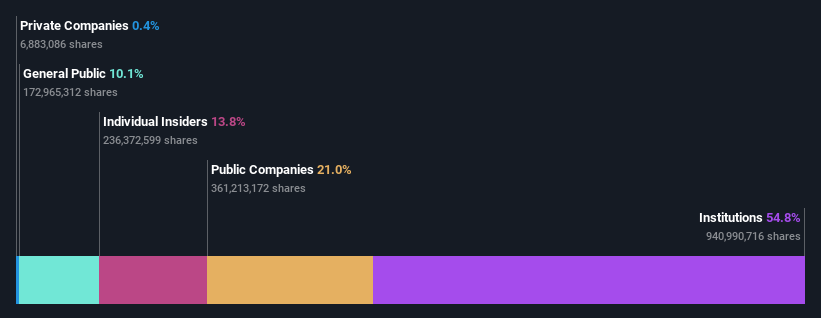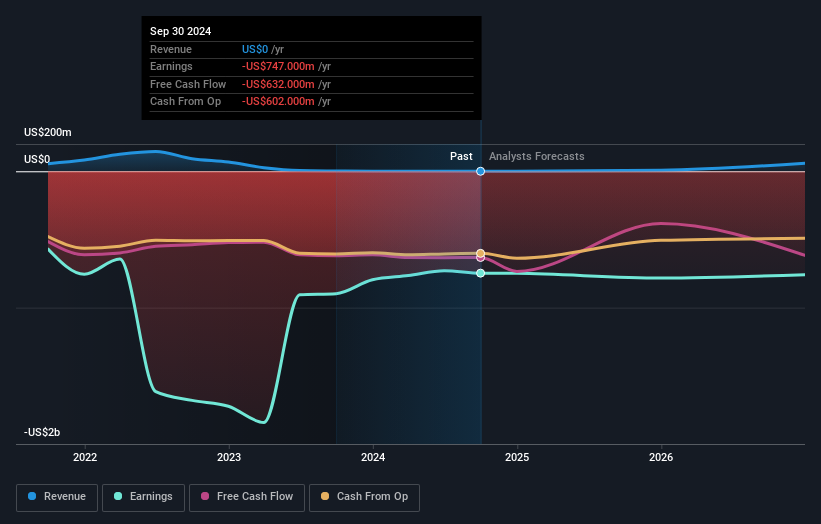- United States
- /
- Software
- /
- NasdaqGS:AUR
Institutional investors in Aurora Innovation, Inc. (NASDAQ:AUR) see US$1.7b decrease in market cap last week, although long-term gains have benefitted them.

Key Insights
- Institutions' substantial holdings in Aurora Innovation implies that they have significant influence over the company's share price
- The top 5 shareholders own 52% of the company
- Recent sales by insiders
If you want to know who really controls Aurora Innovation, Inc. (NASDAQ:AUR), then you'll have to look at the makeup of its share registry. And the group that holds the biggest piece of the pie are institutions with 55% ownership. That is, the group stands to benefit the most if the stock rises (or lose the most if there is a downturn).
No shareholder likes losing money on their investments, especially institutional investors who saw their holdings drop 13% in value last week. However, the 60% one-year returns may have helped alleviate their overall losses. But they would probably be wary of future losses.
Let's delve deeper into each type of owner of Aurora Innovation, beginning with the chart below.
See our latest analysis for Aurora Innovation

What Does The Institutional Ownership Tell Us About Aurora Innovation?
Institutions typically measure themselves against a benchmark when reporting to their own investors, so they often become more enthusiastic about a stock once it's included in a major index. We would expect most companies to have some institutions on the register, especially if they are growing.
As you can see, institutional investors have a fair amount of stake in Aurora Innovation. This implies the analysts working for those institutions have looked at the stock and they like it. But just like anyone else, they could be wrong. It is not uncommon to see a big share price drop if two large institutional investors try to sell out of a stock at the same time. So it is worth checking the past earnings trajectory of Aurora Innovation, (below). Of course, keep in mind that there are other factors to consider, too.

Since institutional investors own more than half the issued stock, the board will likely have to pay attention to their preferences. We note that hedge funds don't have a meaningful investment in Aurora Innovation. The company's largest shareholder is Uber Technologies, Inc., with ownership of 19%. T. Rowe Price Group, Inc. is the second largest shareholder owning 13% of common stock, and Christopher Urmson holds about 8.5% of the company stock. Christopher Urmson, who is the third-largest shareholder, also happens to hold the title of Chairman of the Board.
To make our study more interesting, we found that the top 5 shareholders control more than half of the company which implies that this group has considerable sway over the company's decision-making.
While studying institutional ownership for a company can add value to your research, it is also a good practice to research analyst recommendations to get a deeper understand of a stock's expected performance. There are a reasonable number of analysts covering the stock, so it might be useful to find out their aggregate view on the future.
Insider Ownership Of Aurora Innovation
While the precise definition of an insider can be subjective, almost everyone considers board members to be insiders. Company management run the business, but the CEO will answer to the board, even if he or she is a member of it.
Most consider insider ownership a positive because it can indicate the board is well aligned with other shareholders. However, on some occasions too much power is concentrated within this group.
Our most recent data indicates that insiders own a reasonable proportion of Aurora Innovation, Inc.. Insiders own US$1.7b worth of shares in the US$12b company. That's quite meaningful. Most would be pleased to see the board is investing alongside them. You may wish to access this free chart showing recent trading by insiders.
General Public Ownership
The general public-- including retail investors -- own 10% stake in the company, and hence can't easily be ignored. While this group can't necessarily call the shots, it can certainly have a real influence on how the company is run.
Public Company Ownership
Public companies currently own 21% of Aurora Innovation stock. This may be a strategic interest and the two companies may have related business interests. It could be that they have de-merged. This holding is probably worth investigating further.
Next Steps:
It's always worth thinking about the different groups who own shares in a company. But to understand Aurora Innovation better, we need to consider many other factors. Case in point: We've spotted 4 warning signs for Aurora Innovation you should be aware of, and 1 of them shouldn't be ignored.
But ultimately it is the future, not the past, that will determine how well the owners of this business will do. Therefore we think it advisable to take a look at this free report showing whether analysts are predicting a brighter future.
NB: Figures in this article are calculated using data from the last twelve months, which refer to the 12-month period ending on the last date of the month the financial statement is dated. This may not be consistent with full year annual report figures.
New: Manage All Your Stock Portfolios in One Place
We've created the ultimate portfolio companion for stock investors, and it's free.
• Connect an unlimited number of Portfolios and see your total in one currency
• Be alerted to new Warning Signs or Risks via email or mobile
• Track the Fair Value of your stocks
Have feedback on this article? Concerned about the content? Get in touch with us directly. Alternatively, email editorial-team (at) simplywallst.com.
This article by Simply Wall St is general in nature. We provide commentary based on historical data and analyst forecasts only using an unbiased methodology and our articles are not intended to be financial advice. It does not constitute a recommendation to buy or sell any stock, and does not take account of your objectives, or your financial situation. We aim to bring you long-term focused analysis driven by fundamental data. Note that our analysis may not factor in the latest price-sensitive company announcements or qualitative material. Simply Wall St has no position in any stocks mentioned.
About NasdaqGS:AUR
Aurora Innovation
Operates as a self-driving technology company in the United States.
Flawless balance sheet and fair value.
Similar Companies
Market Insights
Community Narratives



